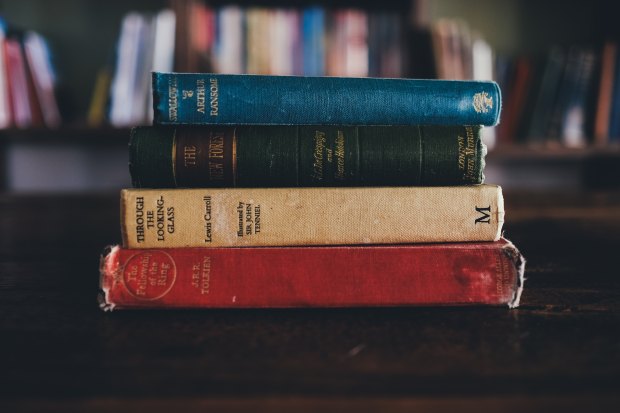
Photo: Annie Spratt, www.unsplash.com.
Ever since I was a little girl, I have loved words.
I used to sit on the couches in our bus during lunch time, dreaming of words and phrases, rolling them around in my head, “tasting” them. . .just like I tasted Mom’s potato soup.
My guess is that these words and phrases–these bits of dialogue–were hybrid lines and impressions from movies my siblings and I had watched. Or autobiographies and fiction books I had read. They certainly were not original to me. Nevertheless, they persisted in planting themselves in my mind and taking root.
Even now, words captivate me with their strength and beauty. Currently, I am fostering a love of poetry, of creative nonfiction, of self-help books–genres I never considered when I was a girl busily reading Nancy Drew or the Mandie books or Janette Oke (all of the important authors a good Baptist girl reads).
My years at Pensacola Christian College taught me one thing: I was not as well-read as I believed myself to be. For someone who adores words, I had only a basic knowledge of the classics. I found that I was sorely lacking when it came to reading deeper, more challenging books. I had made a habit of looking up any word I encountered that was new to me, yet I had not enriched my reading experiences by delving into more substantive titles.
The faculty at Pensacola Christian College carefully taught me the definitions of good and bad literature and gave me the tools to discern between the two.
The literature classes I sat in mesmerized me. Quietly, I listened and pretended to understand as other students discussed various literary themes and ideas in the books we read. They brought up topics that had not entered my tired brain at 10:42 p.m. the night before as I hurriedly scanned the required pages for the next day’s quiz.
“Notice how Hawthorne used the idea of shame in this passage,” our teacher would say.
I flipped to the page he was indicating. Yes. Hawthorne apparently did use ideas of shame, of forgiveness even.
Then the students around me would impart their knowledge.
“When he wrote about the light shining in the window, it was then that I thought of. . .” one student would start. And next would follow a wonderful monologue of context and emphasis and deep thoughts. (Actually, I cannot think of a scene in The Scarlet Letter where light shined in the window, but. . .)
I would stare at them, wondering how on earth they managed to drag that idea out of the passage. I would stare at the page, then blink. What am I missing?
“I wonder if he meant this about the passage in chapter 13, where he states. . .” another would add.
Didn’t catch that, either. How do these people do this? I guess I am just not as intelligent. Yes. That must be it.
I read books with 500-600 pages. Never in my life had I read so many pages in a book. What was Dickens thinking, anyway? I read books that presented new ideas and theories. We traced a line of British writers, of American novelists, and of the ways the literature reflected a subtle downward shift. And all the while, I realized how woefully illiterate I was. Oh, I could read, but had I ever really read?
I studied Creative Writing and Advanced Creative Writing. I had always loved poetry and had even tried my hand at free verse and blank verse. But I had not learned to read poetry and to appreciate it, nor had I studied its many styles and nuances. I took to poetry as if I had found the correct way to breathe.
Creative Nonfiction opened up another world to me. I was unaware that such a genre even existed. I devoured writing by Annie Dillard (possibly my favorite). I followed my reading assignments carefully, discovered the pull of memoir, and added selections to my personal library.
Even as I started down new literary paths, I became increasingly aware that reading, once a favored hobby for most adults, is losing popularity. The Pew Research Center’s 2015 survey reveals that 72% of adults read only one book a year in any format. According to the Statistic Brain website, 50% of adults read at levels lower than the 8th grade. And 57% of books are never completed.
Our pastor consistently encourages our church to stop, to think, to turn off the TV and grab a book instead. Although statistics in church culture may reflect a better reading trend, I know that all too often, I find myself opting for a movie instead of a book. Reading makes me think, and sometimes I do not want to think anymore.
But reading also enlarges my world. Reading delights and envelopes me. When I have found a good book, I feel like I have made a new friend. And when I finish a good book, I struggle saying goodbye.
Despite statistics and trends, I have decided to continue cultivating a literary life.
Reading may not be as popular as it once was. Reading may require me to stretch myself. But the benefits are enormous–and I cannot resist the magic of fine writing.
This is my journey. This is my literary life of words.
Annie Dillard–dear old Annie, my literary mother. I’m so happy that you love her as much as I do. 🙂
LikeLiked by 1 person
She’s incredible. 🙂 Thanks for stopping by. I miss you, lady!
LikeLike